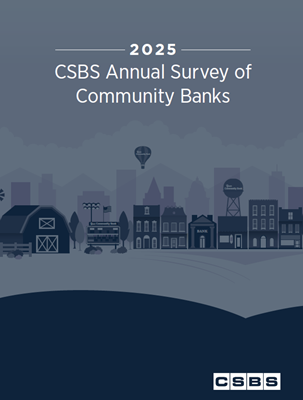CSBS Releases 2025 Annual Survey of Community Banks

According to the Conference of State Bank Supervisors’ (CSBS) 2025 Annual Survey of Community Banks, community bankers across the nation ranked net interest margins as their highest external risk, followed by core deposit growth. Economic conditions, the cost of technology, and cost of funds were essentially tied as their third highest risk. Meanwhile, they expressed less concern about regulatory impact. Regulation, which was tied as the top external risk in the 2024 survey, fell to the sixth spot, as community bankers expressed less concern over regulatory burden amid a changing political landscape.
The complete survey can be found on the CSBS website at: https://www.csbs.org/survey.
In terms of internal risks, cybersecurity once again topped the list. Indeed, the share of community bankers reporting this as an extremely important risk (58%) surpassed all other risks—both external and internal—by a healthy margin. Technology implementation and related costs ranked second, while credit replaced liquidity in the third spot. This year’s special questions focused on the deposit insurance framework and fraud.
Other key findings and insights from the 2025 survey include:
- Bankers continued to report inflation-created challenges as persistent but manageable. While bankers still saw the greatest impact from inflation on the cost of deposits, followed by personnel expenses, more respondents cited inflation effects on operating expenses in this year’s survey.
- Community banks continued to cite other community banks as their largest competitor—in seven of nine product and service lines—and reported local regional banks as their primary competitor for payment services and in-market nonbanks as their top competitor for wealth management and retirement services.
- Payment services competition showed the largest year-over-year change, with competition from nonbanks without a physical presence in the market increasing by 7 percentage points.
- Respondents that received and seriously considered accepting an acquisition offer doubled between 2024 and 2025, rising to 12%. Inability to achieve economies of scale was cited as the primary reason for consideration.
- On average, respondents reported that adhering to safety and soundness practices accounts for the largest share of total compliance expenses, at 27%. Money laundering and consumer protection standards had the second- and third-largest shares, at 25% and 23%, respectively.
- Most respondents (79%) indicated they would support changing the current deposit insurance framework, with targeted unlimited coverage and increased coverage scoring the highest among alternative solutions. Of those survey respondents favoring an increase to the deposit insurance limit, the majority (72%) viewed a new limit of $500,000 as appropriate.
- According to this year’s survey, credit and debit card fraud was both the most common type of fraud reported and the largest source of dollar losses, followed by check fraud, and identity theft and account takeover, respectively. Together, these three types of fraud accounted for nearly 88% of total fraud cases and more than 80% of dollar losses.
